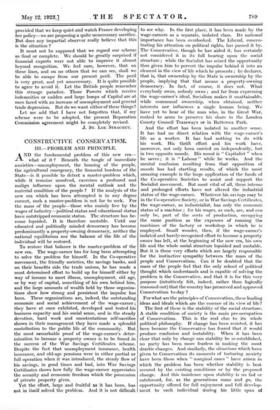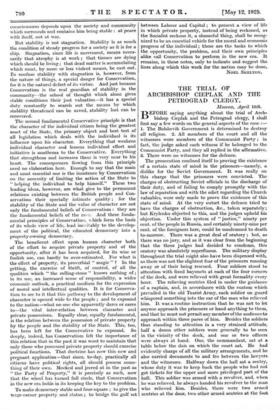CONSTRUCTIVE CONSERVATISM. III.—PROBLEM AND PRINCIPLE.
AND the fundamental problem of this new era— what of it ? Beneath the tangle of immediate anxieties—unemployment, the housing of the people, the agricultural emergency, the financial burdens of the State=is it possible to detect a master-problem which, while • it remains unsolved, exercises a profound 'and malign influence upon the mental outlook and the material condition of the people ? If the analysis of the new era which has been attempted is in any degree correct, such a master-problem is not far to seek. For the mass of the people—those who mainly live by the wages of industry—political status and educational status have outstripped economic status. The structure has be- come lopsided. It is therefore unstable. Until our educated and politically minded democracy has become predominantly a property-owning democracy, neither the national equilibrium nor the balance of the life of the individual will be restored.
To restore that balance is the master-problem of the new era. The wage-earner has for long been attempting to solve the problem for himself. In the Co-operative movement, the friendly societies, the savings banks, and on their benefits side the trade unions, he has made a most determined effort to build up for himself either by way of income to meet illness, unemployment, old age, or by way of capital, something of his own behind him, and the large amounts of wealth held by those organiza- tions show how strong and persistent the impulse has been. These organizations are, indeed, the outstanding economic and social achievement of the wage-earner ; they have at once exhibited, developed and tested his business capacity and his social sense, and in the steady devotion, hard work and unostentatious self-sacrifice shown in their management they have made a splendid contribution to the public life of the community. But the most remarkable proof of the wage-earner's deter- mination to become a property owner is to be found in the success of the War Savings Certificates scheme. Despite the fact that unemployment insurance, health insurance, and old-age pensions were in either partial or full operation when it was introduced, the steady flow of his savings, in good times and bad, into War Savings Certificates shows how fully the wage-earner appreciates the security and economic freedom which the possession of private property gives.
Yet the effort, large and fruitful as it has been, has not in itself solved the problem. And it is not difficult to see why. In the first place, it has been made by the wage-earners as a separate, isolated class. Its national importance has been overlooked. The Liberal, concen- trating his attention on political rights, has passed it by. The Conservative, though he has aided it, has certainly not considered it in its full bearing upon the social structure ; while the Socialist has seized the opportunity thus given him to pervert the impulse behind it into an element in the view of life which he presents ; he declares, that is, that ownership by the State is ownership by the people, implying that that means a property-owning democracy. In fact, of course, it does not. What everybody owns, nobody owns ; and far from expressing the wage-earner's ideal, Socialism makes it unattainable, while communal ownership, when obtained, neither interests nor influences a single human being. We have yet to hear of the man who, in the Great War, rushed to arms to preserve his share in the London County Council Tramways or in Battersea Park.
And the effort has been isolated in another sense. It has had no direct relation with the wage-earner's life as a worker. It has had nothing to do with his work. His thrift effort and his work have, moreover, not only been carried on independently, but in two opposite moods. His mood is " Capitalist " when he saves ; it is ." Labour " while he works. And the mental confusion resulting from that opposition of moods has had startling results, of which the most amazing example is the large application of the funds of the Co-operative Societies to assist and support the Socialist movement. But most vital of all, these intense and prolonged efforts have not altered the industrial status of the wage-earner. Whatever his savings may be in the Co-operative Society, or in War Savings Certificates, the wage-earner, as industrialist, has only the economic status of a machine ; for his wages, as such, are, and can only be, part of the costs of production, occupying the same position as the expenses of running the machines of the factory or workshop in which he is employed. Small wonder, then, if the wage-earner's isolated and barely-recognized effort to become a property owner has left, at the beginning of the new era, his own life and the whole social structure lopsided and unstable. But it is these very efforts which are largely responsible for the instinctive sympathy between the mass of the people and Conservatism. Can it be doubted that the mass of the people feel that the only school of political thought which understands and is capable of solving the problem is the Conservative, and that it is for this very purpose (intuitively felt, indeed, rather than logically reasoned out) that the country has preserved and approved Conservatism to-day ?
For what are the principles of Conservatism, these leading ideas and ideals which are the essence of its view of life ?
The first of these is the stability of the social structure. A stable condition of society is the main pre-occupation of Conservatism. This is the real clue to its whole political philosophy. If change has been resisted, it has been because the Conservative has feared that it would produce confusion and instability. When it has been clear that only by change can stability be re-established, no party has been more fearless in making the most drastic changes. And similarly, the situations which have given to Conservatism its moments of torturing anxiety have been those when " marginal cases " have arisen in which the problem has been whether stability is best secured by the existing conditions or by the proposed change. And this insistence upon stability is no fad or catchword, for, as the generations come and go, the opportunity offered for full enjoyment and full develop- ment to each individual during his little span of consciousness depends upon the society and community which surrounds -and contains him being stable : at peace with itself, not at war.
But stability is not stagnation. Stability is as much the condition of steady progress for a society as it is for a ship. Stagnation, since life is movement, means neces- sarily that atrophy is at work ; that tissues are dying which should be living ; that dead matter is accumulating which must, by more or less violent means, be cast out. To confuse stability with stagnation is, however, from the nature of things, a special danger for Conservatism, for it is the natural defect of-its virtue. And just because Conservatism is the real guardian of stability in the cornnumity—the school of thought which alone gives stable conditions their just valuation—it has a special duty constantly to search out the means by which stability threatened can be saved, stability lost can be -recovered.
The second fundamental Conservative principle is that the character of the individual citizen being the greatest asset of the State, the primary object and best test of .all legislation which deals with the individual is its influence upon his character. Everything that weakens individual character and lessens individual effort and initiative is anathema to the Conservative. Everything that strengthens and increases these is very near to his heart. The consequences flowing from this principle need no elaboration here. Enough to say that the main and most essential one is the insistence by Conservatism on the necessity of limiting the action of the State to " helping the individual to help himself." These two leading ideas, however, are •what give to 'the permanent relations existing between the British people and Con- servatism their specially intimate quality ; for the stability of the State and the value of character are not only the fundamental beliefs of Conservatism : they are the fundamental beliefs of the rave. And these funda- mental principles of Conservatism, which form the basis of its whole view of life, lead inevitably to the develop- ment of the political, the educated democracy into a property-owning democracy.
The beneficent effect upon human character both of the effort to acquire private property and of the opportunity, after it has been acquired, for its wise or foolish use, can hardly be over-estimated. For what is the effect of property, its proverbial " magic " ? In the getting, the exercise of thrift, of control, of all the qualities which " the rolling-stone " knows nothing of ; in its use, an increased- sense of responsibility, a wider economic outlook, a practical medium for the expression of moral and intellectual qualities. It is for Conserva- tism to see to it that this pathway to the development of character is opened wide to the people ; and to expound to the nation—what no one else apparently dares or cares to—the vital inter-relation between character and private possessions. Equally clear, equally fundamental, is the relation between the possession of private property by the people and the stability of the State. This, too, has been left for the Conservative to expound. So deeply, indeed, has Conservatism felt the importance of this relation that in the past it was wont to maintain that only those who possessed private property should exercise political functions. That doctrine has now this new and pregnant application—that since, to-day, practically all citizens have political rights, all should possess some- thing of their own. Mocked and jeered at in the past as " the Party of Property," it is precisely as such, now that the wheel has turned full circle, that Conservatism in the new era holds in its keeping the key to the problem.
To make democracy stable and four-square ; to give the wage-earner property and status ; to bridge the gulf set between Labour and Capital ; to present a view of life in which private property, instead of being reckoned, as the Socialist reckons it, a shameful thing, shall be recog- nized to be an essential vehicle for the moral and economic progress of the individual ; these are the tasks to which the opportunity, the problem, and their own principles alike call Conservatism to perform in the new era. It remains, in these notes, only to indicate and suggest the lines along which this work for the nation may be done.
No SKELTON.



















































 Previous page
Previous page